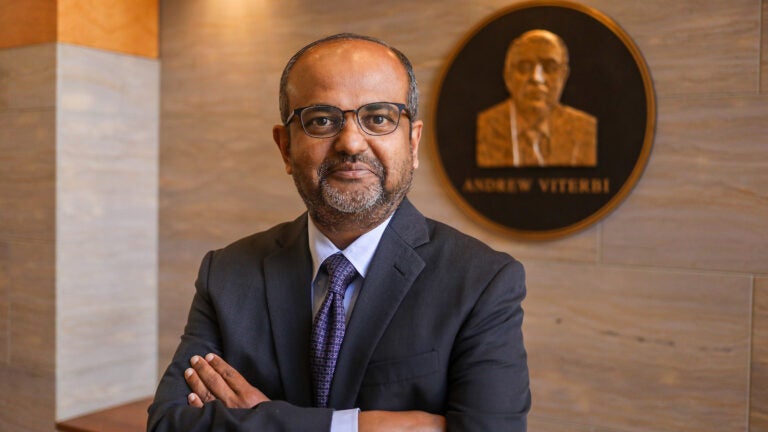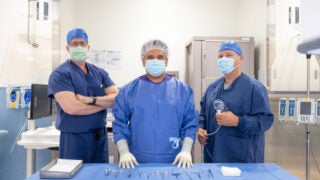
Gaurav Sukhatme — a professor of computer science and electrical and computer engineering, and executive vice dean of the USC Viterbi School of Engineering — was appointed as the USC School of Advanced Computing’s inaugural director. (USC Photo/Cooper Brown)
Q&A with USC School of Advanced Computing Director Gaurav Sukhatme
“Computer science at USC is special, indeed,” says the head of USC’s newest school.
Editor’s Note: Gaurav Sukhatme — a professor of computer science and electrical and computer engineering, and executive vice dean of the USC Viterbi School of Engineering — has been appointed by USC President Carol Folt as the inaugural director of the USC School of Advanced Computing. He sat down with USC’s Caitlin Dawson for a conversation about the new school, its mission, the future — and his first day at USC.
You have a long and storied history at USC, commencing as a doctoral student in computer science almost 30 years ago. How did it begin? Can you tell us about your first day at USC?
Well, it was not a terribly auspicious beginning! The airline lost my bags, and I realized that I had not planned very well since orientation had finished by the time I arrived.
To further compound matters, when I tried to sign up for classes, I was told that I had to first take an oral exam administered one-on-one by Professor Seymour Ginsburg, a famously tough professor, in his office. Luckily, my bags arrived intact, and I passed the exam, and things started to look up after that. Fast forward 30-odd years, and here we are.
What a difference 30 years makes! Could you ever have imagined that you would be sitting in the director’s chair one day?
Not at all. I just wanted to learn as much as I could about robotics and artificial intelligence. The computer science department at USC was then, and remains today, a wonderful place to do that!
Beyond your personal connection, could you explain what makes computer science at USC so special?
Computer science at USC is special, indeed. One aspect is its formidable legacy. Collectively, computer science faculty at USC are world-leading experts across many aspects of the core discipline. Then, there is the interdisciplinarity, which is in our DNA at USC. Many of our faculty members are cross-appointed in other departments and schools, reflecting their trans-disciplinary contributions.
► RELATED: USC launches School of Advanced Computing
Additionally, several computer science faculty members lead projects at the Information Sciences Institute (ISI) or the Institute for Creative Technologies (ICT). These are truly one-of-a-kind organizations that have played a key role in USC’s reputation in computer science and related fields, including the invention of the Domain Name System (DNS) and the first integrated circuit foundry service.
Is there anything unique about the structure of the new school?
One aspect is its all-encompassing nature. Within our traditional strengths at USC Viterbi, the SAC brings together faculty and programs across the “full computing stack” in both computer science and electrical and computer engineering, both at the University Park Campus (UPC) and at ISI and ICT.
Additionally, all other USC Viterbi departments have significant strengths in computing-related research and teaching — they will play a key role in shaping the new school.
The SAC’s mission is to drive cross-university initiatives in areas of education and research involving advanced computing, so I’m excited about a new structure we’re creating: Advanced Computing Affinity Groups, a mechanism to engage scholars across all disciplines in shaping the future of computing research and education.
With the Dr. Allen and Charlotte Ginsburg Human-Centered Computation Hall set to open in the summer, how do you envision this facility enhancing the learning and research experiences for students and faculty?
The new building is designed to act as a “people collider.” It has dedicated learning spaces for undergraduates to work on assignments and their own projects. It also provides innovative new facilities in computing for both undergraduates and graduate students to pursue research in collaboration with faculty mentors.
We’re very excited by the new possibilities the building brings to life. As Allen and Charlotte like to say, the building is a home for “beautiful minds,” a place where they can collaboratively bring their creativity to bear on important problems resulting in new discoveries for the benefit of humanity.
Why is it important for students in all fields to have a solid grounding in technology and ethics?
Technology, and computing in particular, affects all aspects of modern life. Not only do students in all fields need to have a solid grounding in computing to pursue their professional careers, but they also need the tools and frameworks to participate in the debate on the ethical implications of how society uses computing and technology.
We already have a rich set of courses and minors in computing, which are taken by students across the university. We plan to build on these to create new programs and courses, many of which will be the result of cross-school collaborations.
What does “responsible technology” mean to you, and why is it important?
To me, responsible technology means constantly thinking about and reflecting on the consequences of technological innovation and acting accordingly. In computing, I think a guiding principle should be a focus on human-centered computing — to always think about the consequences of what we develop, with people at the center.
In your opinion, what are some of the biggest opportunities for computer science at USC in the next few years?
Without a doubt, this is a transformative time for computer science. Artificial intelligence is having a significant impact on many fields, to the extent that it is changing the way computer scientists think about virtually all aspects of computer science research and education.
The success of AI, with an emphasis on vast amounts of data and machine learning, is spurring computer scientists to innovate AI systems that are fair, efficient and preserve privacy.
In addition, there is a flowering of new research in theoretical computer science, which aims to understand the limits of data-centric approaches. The ways we think about how software is written, how it is maintained, and how computer networks are organized and kept secure, are all undergoing a transformation.
In the past decade, computer vision and the processing of “natural” or human language have really taken off as well, and the newest generative approaches suggest that there is a lot more to come. In my own field of robotics, the excitement is palpable in sectors ranging from vehicle autonomy to factory automation.
Now, to learn more about you. Can you tell us a bit about where you’re from and your upbringing?
I was brought up in Mumbai and attended the Indian Institute of Technology Bombay for my undergraduate studies in computer science and engineering. My father is a professor of mechanical engineering, and my mother is a medical doctor. Both are now retired. I’m married to Dr. Kalyani Sukhatme, a physicist at the Jet Propulsion Laboratory, and we have two children, Mihir and Sonal.
What is the best advice you have ever received?
I’ve been the recipient of so much excellent advice over the years that I can’t narrow it down to a single piece. I just want to say thank you to my many mentors for all their help, support and encouragement.
Is there a little-known fact about you that you could share?
I don’t know how well-known it is, but I am an ardent cricket fan.
If you hadn’t become a computer scientist, what might you have done instead?
I would probably have studied physics or history, my two favorite subjects in school.



